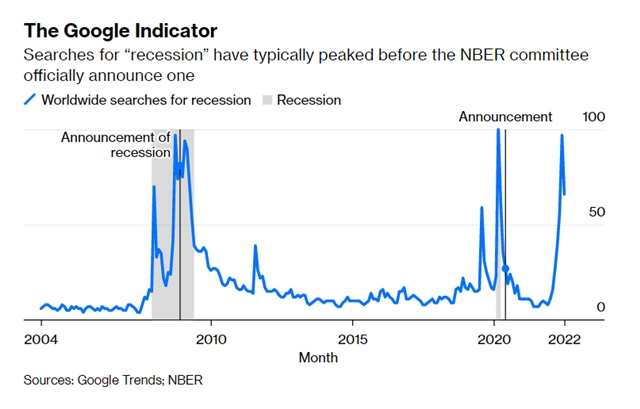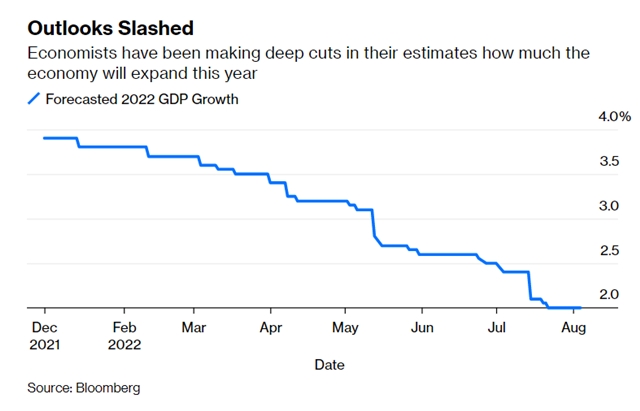Google Trends: A ‘reputation’ recession indicator in the 4.0 era
- Tram Ho
We don’t need to wait for GDP to decline for two consecutive quarters to make a judgment that the US economy has entered or is about to enter a recession. And we don’t need to wait for an official confirmation from the National Bureau of Economic Research (NBER). Economic data is often lagged, and the assessment process often consumes a lot of time for the agency. What we need to do is look at the number of searches for the word “recession” on Google Search.
Recession stories not only give us a better look at what’s happening to the economy, but also increase the risk of a real recession, stemming from panic among businesses and consumers. The recent decline in consumer confidence, as reported by the Conference Board and the University of Michigan, is the clearest evidence of this phenomenon.
When consumers and business owners face a range of “extreme” economic conditions, they often worry and talk a lot about recessions. This is not an orthodox recession measure that economists use as often as the drop in new jobs and the inversion of the yield curve. Instead, it is more of a method of predicting an impending phenomenon. Currently, the correlation between the phenomenon of declining consumer confidence and the increasing appearance of the keyword “recession” on Google is increasing.

Searches for the word “recession” on Google often spike before periods of recession confirmed by the NBER. Photo: Bloomberg.
There are many other examples to demonstrate this. During the period when gasoline prices in the US skyrocketed to the threshold of 5 USD / gallon, the correlation between the number of searches for the word “recession” on Google and the upward trend in fuel prices increased by 78%. Drivers immediately became impatient because they often had to refill their fuel tanks. This is completely different from replacing a water heater when it leaks, which only happens about once every 20 years on average. How can they remember the price of the old water heater after all these years? With the midterm elections approaching, the political impact of the fuel price increase is becoming more and more obvious as President Joe Biden has to put aside his green energy development plan and “beg for help”. help from Saudi Arabia.
Stock market declines are common before recessions. The correlation between the decline in the S&P 500 index this year and the number of keywords “recession” searched on Google increased to 82%. Investors, heavily worried about recession risks, often tend to sell off stocks, putting downward pressure on the stock market. This in turn makes more people believe that a recession is approaching.
High mortgage rates, which make it more expensive to buy a home, are also highly correlated with Google searches for the word “recession.” The same thing happens when the consumer price index (CPI) increases, reducing people’s purchasing power. In June, the CPI in the US increased by 9.1% over the same period in 2021, while the growth of worker income only stopped at 5.1%. Americans are more worried about the recession and constrained spending, so the risk of recession increases.
The outlook is gloomy
Reducing inflation is the most important goal of the US Federal Reserve, and they are willing to trade that for a recession. Having lagged behind inflation, the US central bank aspires to restore credibility by reducing inflation at all costs. And they certainly will not “hold their hands” on Wall Street.

The US economic outlook continues to deteriorate in the eyes of experts. Photo: Bloomberg.
Outside of the Fed’s hardline stance on inflation, the inventory surplus is also a “barrier” for the US economy. Merchandise piled up after the peak Christmas and New Year shopping season, besides, many supply chain bottlenecks were removed, causing goods to flood into warehouses, stores and supermarkets across the US. In January, there were 109 ships waiting in line outside the ports of Los Angeles and Long Beach, but four months later, the number of ships waiting dropped to 16.
Many large retail chains such as Macy’s and Target were forced to clear inventory and cut orders. The difficult situation of facing a big challenge is the view of tightening consumer spending in the context that their beliefs and real income are affected by inflation. McDonald’s says its low-income customer segment is spending less and less, while AT&T says more and more users are late in paying their telecommunications bills each month.
The number of unsold homes is also increasing every day as the real estate bubble begins to cool. Mortgage interest rates and high house prices make many people give up their dreams. The construction sector accounts for only 3.5% of the GDP of the entire economy, but a weakening in this sector will have a huge impact on many other important sectors such as finance, building materials and furniture.
In its latest economic outlook report, the International Monetary Fund (IMF) lowered its growth forecasts for the US in 2022 and 2023 to 3.2% and 2.9%, respectively, down 0.4 and 0. 7 percentage points compared to the assessment three months ago.
Source : Genk
